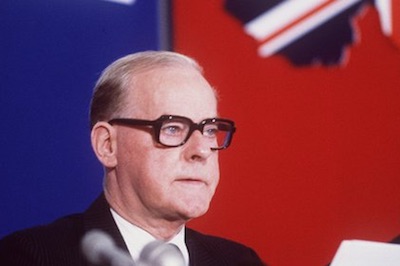
Former Ulster Unionist leader Jim Molyneaux died on Monday at the age of 94. A deeply conservative Orangeman, he led the party from 1979 until 1995.
Although notorious in the north of Ireland for his implacable intransigence against political change, he was deceptively mild-mannered and even lauded in Britain and the 26 Counties as a relative unionist moderate.
Although sometimes eclipsed by the more openly aggressive personality of former DUP Ian Paisley, Molyneaux remained the leader of the north’s largest unionist party until he quit at the age of 74. Like Mr Paisley, he was prepared to endorse illegal acts in certain circumstances, but preferred to act within the law.
He was “appalled” by the 1972 decision to abolish Stormont and impose direct rule from London, and a few years later proposed the restoration of Stormont’s powers. He also attacked as a “monstrosity” Thatcher’s Anglo-Irish inter-governmental council of 1981.
He was at his most vitriolic in his opposition to the 1985 Anglo Irish Agreement. As a protest against the agreement, he and 14 other Unionists resigned from the Commons and fought by-elections. He and all but one other recaptured their seats.
Mr Molyneaux criticised Nobel Prize Winner John Hume, the former SDLP leader, for “grubbing around the backstreets of Belfast” to meet Sinn Fein leader Gerry Adams, and infamously described the Provisional IRA ceasefire of 1994 as “the most destabilising event since partition”.
He contemptuously dismissed peace process ‘initiatives’ and ‘high-wire acts’. He said he preferred to see “a people at ease with each other in an Ulster at ease with itself”.
Although displaced by UUP leader by David Trimble as political negotiations intensified in 1995, Molyneaux continued to denounce the idea of sharing power with nationalists as an unnatural and abnormal idea.
He continued into his eighties to support Trimble’s internal enemies. When the DUP overtook the Ulster Unionists in the assembly elections of November 2003, Molyneaux supported calls for Trimble’s resignation.
He was knighted in 1996 and became a life peer in 1997, taking the title ‘Lord’, later ‘Baron’ Molyneaux of Killead, his County Antrim birthplace. He also ascended to become “Imperial Grand Master” of the Orange Order and “Sovereign Grand Master” of its Royal Black Preceptory.
Current UUP leader Mike Nesbitt described Molyneaux as “one of the greatest” unionists.
“He was no showman, but a man of immense guile, playing the game of political chess, ignoring the cheap headlines to focus on strategic outcomes,” he said.
Ulster Unionist Party chairman Reg Empey said: “Affectionately known to his senior colleagues as ‘the wee man’... Jim was always a no-frills politician.”
The 26 County foreign affairs minister, Charlie Flanagan, said Lord Molyneaux “resolutely led the party during some of the most difficult days of the Troubles”.
Sinn Fein leader Gerry Adams said: “We had obvious and strong political differences but this is a sad time for Mr Molyneaux’s family and friends and I wish to extend on my own behalf and that of Sinn Fein our condolences and sympathy to them.”
![[Irish Republican News]](https://republican-news.org/graphics/title_gifs/rn.gif)
![[Irish Republican News]](https://republican-news.org/graphics/title_gifs/harp.gif)

